Backed By the President’s Budget Requests, Congressional Appropriations Show No Concern For the Needs of Blacks and Low-Income College Students
Stinginess marked Congress' current appropriations for the needs of low-income students. The maximum Pell Grant award for the poor will remain at $4,050, the same level that has been in effect for the past three years. Also, government funding of other financial assistance programs for low-income or disadvantaged students will at best see token increases.

Government support for historically black colleges and universities shows slight increases and these increases do not come close to matching the rise in inflation. The appropriation to support Howard University will increase from $239 million to $240 million. Aid to other HBCUs will rise from $239 million to $241 million. Financial assistance to predominantly black graduate institutions will rise from $58 million to $58.5 million.

New Orleans' Black Colleges Begin the Long Road to Recovery
 Four and half months after their campuses were flooded in the aftermath of Hurricane Katrina, Dillard University, Xavier University, and Southern University of New Orleans are back in business. Preliminary figures show that about 75 percent of the students who were enrolled at Xavier this past fall, before Hurricane Katrina devastated New Orleans, have returned to campus for the spring semester. "We’re rebuilding the university as an island in the city," says Norman Francis, president of the university. Francis calls the neighborhood surrounding the Xavier campus "dead." Four and half months after their campuses were flooded in the aftermath of Hurricane Katrina, Dillard University, Xavier University, and Southern University of New Orleans are back in business. Preliminary figures show that about 75 percent of the students who were enrolled at Xavier this past fall, before Hurricane Katrina devastated New Orleans, have returned to campus for the spring semester. "We’re rebuilding the university as an island in the city," says Norman Francis, president of the university. Francis calls the neighborhood surrounding the Xavier campus "dead."
At Southern University of New Orleans, FEMA trailers have been set up as classroom buildings. Students with no housing are temporarily being put up at the New Orleans Marriott Hotel.
More than half of Dillard University's 2,000 students have returned to New Orleans. About 80 percent of the returning students are being housed at the Hilton New Orleans Riverside Hotel. Because the hotel’s typical convention business has not returned and will not return in the foreseeable future, the hotel has rented out a third of its space to Dillard. Students receive free cable TV, have maid service twice a week, and have access to laundry facilities. The hotel provides three meals a day on weekdays and two on weekends. But pay-for-view movies and room service are not available to Dillard students. The hotel’s ballrooms have been converted into classroom space. Alcohol is prohibited on the Dillard campus in New Orleans but the Hilton’s bars remain open for business.

  |
"The excuses we still hear are, ‘There’s not enough people out there. The pool is weak. They don’t have enough experience.’ What it really comes down to is their funding people and alumni. Will their fundraisers back these people of color? And in some cases, they won’t."
— Eugene Marshall Jr., deputy athletics director at the U.S. Military Academy and membership president of the Black Coaches Association, discussing the slow progress in hiring black head coaches in big-time college football, in Newsday
|
Percentage of College Applicants Who Decline to Divulge Their Race is on the Rise
In recent years many students have become reluctant to disclose their race on college applications. A new study by the James Irvine Foundation's Campus Diversity Initiative finds that in 2001, 5.9 percent of all college students declined to disclose their race on their application form. This is up from 3.2 percent in 1991. The study concludes that the vast majority of those students who decline to divulge their race on the college application form are white.
JBHE has conducted an analysis on the percentage of students at the nation's highest-ranked colleges and universities who have not divulged their race. At many of the nation's highest-ranked universities, a far greater proportion of their undergraduate students than the national average of 5.9 percent are listed on the Department of Education's enrollment data as having no racial classification. For example, in 2004, according to the official figures Columbia University reported to the U.S. Department of Education, 14.9 percent of the student body had not been identified by race. At Brown University, 14.4 percent of the students are classified as "racial unknowns." In fact, at seven of the nation's 29 highest-ranked universities in 2004, at least 10 percent of the student body, according to JBHE's count, has not been racially identified.
JBHE research also demonstrates that the number of students who decline to divulge their race is on the rise. At 15 of the nation's 29 highest-ranked universities, the percentage of racial unknowns increased from 2001 to 2004. The largest increase was at the University of Chicago. In 2001, the university reported racial data for all of its undergraduate students. In 2004, 9.5 percent of the student body was listed in the race unknown category.

Texas Wins the National Championship in College Football But Ranks Near the Bottom in Graduating Its Black Players
After its exciting come-from-behind victory in last week's Rose Bowl, the University of Texas claimed college football's national championship. But among the nation's 25 highest-ranked college football teams, the University of Texas was at the bottom in its record in graduating its black football players. Using the latest four-year average graduation rate, only 33 percent of the blacks on football scholarships at the University of Texas completed their degree program. Only one other university among the nation's 25 highest-ranked football teams had a poorer record in graduating its black athletes. A mere 27 percent of the black football players at the University of Louisville go on to earn their diploma.
At the other end of the spectrum, the University of Notre Dame, Boston College, and Pennsylvania State University all graduated more than 70 percent of their black football players. Texas Christian University was the only other school among the 25 highest-ranked football teams that graduated at least 60 percent of its black players.

The University of Richmond

Director, Career Development Center
The University of Richmond is noted for its challenging academic programs, excellent facilities, commitment to undergraduate education, and strong resource base, including an endowment of over $1.2 billion dollars. An ambitious 10-year strategic plan provides a strong sense of momentum for the future. Richmond has five schools (Arts and Sciences, Business Leadership Studies, Law, and Continuing Studies) with a full-time undergraduate enrollment of 3200 students.
The University's Career Development Center is a centralized, comprehensive career center. This position reports to the VP for Student Development and provides leadership to a seven-member team. Among other responsibilities, the candidate will direct the day-to-day operation of the center; develop and maintain relationships with employers who have the potential to benefit student employment; update assessment plans to measure student outcomes related to career development; build an effective team of diverse professionals; and manage the operating budget. A master's degree and at least 7-10 years of closely related experience are required.
To obtain more information or to apply for this position, go to www.urjobs.org
The university welcomes applications from diverse candidates and candidates who support diversity.
EOE
Black Leaders Call On the University of Colorado to Step Up Its Racial Diversity Efforts
After a yearlong series of racial incidents on the campus of the University of Colorado, black leaders in Colorado are calling on the university to hire an outside consulting firm to audit the institution's diversity and minority recruitment efforts. State senator Peter Groff thinks that the university is incapable of assessing its own performance. "I want someone from outside the henhouse to come in and take a look," Groff said in a statement.
Black leaders in Colorado have put the university on notice that they expect more aggressive recruitment of black students and faculty and severe penalties for students who commit acts of racial hate on campus.
About 1.6 percent of the students on the Boulder campus are black. The latest count shows 25 blacks among the 1,298 faculty members on campus. 
The Widening Racial Scoring Gap on the Graduate Record Examination
Last week JBHE reported that there has been no progress in recent years in closing the racial scoring gap on the Law School Admission Test. Once again, the mean black score on the LSAT remains about 17 percent below the mean score for whites.
Now we turn to the racial scoring gap on the Graduate Record Examination (GRE). Each year about 300,000 college students seeking admission to graduate programs in fields such as education, the humanities, and the social sciences sit for the GRE. In 2003, the latest year for which there is complete data available, 27,267 blacks took the GRE test. Thus, blacks made up 8.8 percent of all students who took the GRE.
In 2003 the mean score for blacks on the combined verbal and quantitative sections of the GRE was 821. (The GRE is scored on the familiar 400 to 1600 scale that was, until this year, used for the two-part SAT test.) For whites, the mean combined score was 1062. Thus the mean white score was 241 points, or 20 percent, higher than the mean score for blacks. This racial scoring gap is even wider than the persistent and growing gap on the SAT test.
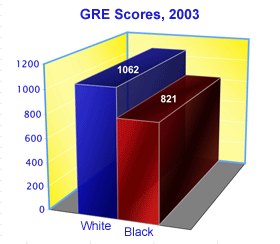
In 1997 the black-white scoring gap on the verbal and quantitative portions of the GRE was 228 points. Therefore, over the next six-year period, we find that the GRE scoring gap between blacks and whites has widened by 13 points.

From Mayor to President?
Washingtonian magazine offers a one-in-three chance that outgoing Washington, D.C., mayor Anthony Williams will be offered the presidency of either American University or the University of the District of Columbia by the end of this year. Stay tuned.

University of North Carolina Wilmington

Center for Leadership Education and Service
DIVISION OF STUDENT AFFAIRS
(Re-Opened Search – January 2006)
The Assistant Director is responsible for administering the leadership education program, the community service program, and working closely with students and staff relative to student leadership and development. Initial consideration of all completed application materials will begin Friday, February 24, 2006.
For more information and to apply online, visit our website at http://consensus.uncw.edu.
Affirmative Action/Equal Opportunity Employer
Appointments
Elizabeth Johnson Walker was appointed associate professor of pastoral care and counseling at Louisville Presbyterian Theological Seminary in Kentucky. She was a professional counselor with the Georgia Association for Pastoral Counseling in Decatur. A graduate of Huntingdon College in Montgomery, Alabama, Professor Walker holds a master’s degree from the Chandler School of Theology in Atlanta and a doctorate in theology from the Gammon Theological Seminary.
Candace Campbell Jackson was promoted to the position of chief of staff for Luis Proenza, president of the University of Akron. Jackson had been an assistant to the president. Jackson is a graduate of Howard University and has a law degree from the University of Akron.

Awards
James Lawson, pastor emeritus of the Holman United Methodist Church in Los Angeles, received the 2005 Distinguished Alumnus Award from Vanderbilt University. In fact, Lawson never earned a degree from the university. He was expelled from the Vanderbilt University Divinity School in 1960 because of his participation in lunch counter sit-ins in Nashville. After a major controversy on campus including the resignation of several faculty members, a compromise was later reached that permitted Lawson to return to Vanderbilt. But he decided to finish his divinity studies at Boston University. A long time ago he reconciled his differences with Vanderbilt and even spent a year on campus during a sabbatical.
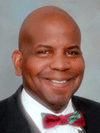 Cato Laurencin, Lillian T. Pratt Distinguished Professor of Orthopaedic Surgery at the University of Virginia, will be presented with the Nicolas Andry Award from the Association of Bone and Joint Surgeons at their annual convention this coming April in Buenos Aires. Dr. Laurencin is being honored for his work in the field of tissue engineering and regenerative medicine. Cato Laurencin, Lillian T. Pratt Distinguished Professor of Orthopaedic Surgery at the University of Virginia, will be presented with the Nicolas Andry Award from the Association of Bone and Joint Surgeons at their annual convention this coming April in Buenos Aires. Dr. Laurencin is being honored for his work in the field of tissue engineering and regenerative medicine.
David Swinton, president of Benedict College in Columbia, South Carolina, was presented with the Samuel Z. Westerfield Award by the National Economic Association. The award, named after a former U.S. ambassador to Liberia, is given to a black economist in recognition of his or her scholarly achievements, institutional leadership, or service to the community.

|
This Year the States Are More Generous Than Uncle Sam in Funding Black Colleges
A report prepared by the Center for the Study of Education Policy at Illinois State University finds that state budget increases for higher education averaged more than 5 percent for the 2005-06 academic year. But the percentage increase in appropriations for many, but not all, black colleges and universities is significantly larger than the average.
It must be remembered that in the past many of these institutions were grossly underfunded by the states compared to the appropriations offered to predominantly white institutions. Thus, the larger than average increases for the black colleges and universities is, in many cases, simply an ongoing effort to correct for the racial discrimination of the past.
Here is a list of some of the black colleges and universities that had significant increases in state aid for the 2005-06 academic year.
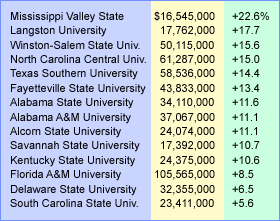

Why the Alito Nomination to the Supreme Court Is So Important to Black Americans
Samuel Alito's membership in the Concerned Alumni of Princeton, a group that was strongly opposed to affirmative action admissions for women and minorities at the university, makes it evident that Alito will move the Supreme Court to the right on issues of affirmative action and better opportunities for black Americans.
At last week's confirmation hearings Senator Joseph Biden of Delaware noted that Sandra Day O'Connor was the "fulcrum on an otherwise evenly divided Court." And on affirmative action issues, O'Connor usually tilted the Court to the left. Biden observed that many of the 5-4 decisions of the Court over the time O'Connor was a sitting justice would have been 5-4 decisions for the conservative viewpoint if Alito were to replace O'Connor.
Well-funded right-wing litigating groups are set to navigate affirmative action in higher education. There can be little doubt that issues of race-sensitive admissions, race-based scholarships, and other issues involving equal access to higher education will soon once again reach the Supreme Court. With Judge Alito replacing Justice O'Connor, the decisions are likely to go against the position favored by the vast majority of African Americans.
When the Senate tallies the confirmation vote, the admission of tens of thousands of black students to colleges, universities, and graduate schools each year may hang in the balance.

Not All Glory in Glory Road
 The new film Glory Road, which premiered this past Friday to rave reviews, tells the remarkable story of the Texas Western College basketball team that in 1966 won the national collegiate championship. The Texas team, with an all-black starting lineup, defeated the all-white perennial powerhouse from the University of Kentucky. The game served to open up college basketball nationwide to black athletes, particularly in the South. The new film Glory Road, which premiered this past Friday to rave reviews, tells the remarkable story of the Texas Western College basketball team that in 1966 won the national collegiate championship. The Texas team, with an all-black starting lineup, defeated the all-white perennial powerhouse from the University of Kentucky. The game served to open up college basketball nationwide to black athletes, particularly in the South.
But there is a seamy side to the tale. The black players were not permitted to live on campus and did not have many of the privileges given to white athletes at the university. Two years after the national championship an article in Sports Illustrated quoted George McCarty, athletics director at Texas Western (which is now known as the University of Texas at El Paso), as saying, "The nigger athlete is a little hungrier, and we have been blessed with having some real outstanding ones. We think they've done a lot for us, and we think we've done a lot for them."

Massachusetts Institute of Technology

Faculty Position, Design Synthesis
The Department of Mechanical Engineering and the Engineering Systems Division seek candidates for a tenure track faculty appointment in Design Synthesis, starting September 2006. MIT is a leader in design, conceptual design and systems architecture but wants to strengthen itself relative to research and teaching of the creative engineering design process. Candidates may have interest in one or more of the following: design, invention, innovation, and creativity and their link to cognitive processes, electro-mechanical systems, product development systems, human/product interface design, sustainable design, customer needs analysis methodology, the role of mathematical modeling in the design and development process. The most important attributes of a successful candidate will be their focus on creativity and innovation both in their teaching and research objectives as well as a strong desire to teach design-related courses. An earned Ph.D in Engineering (or creative technical design expertise developed in another Ph.D program) and evidence of strong research and teaching capabilities are expected.
Applications must include: cover letter; 2-3 page statement of research and teaching interests; curriculum vita; the names and contact information of at least three individuals who will be able to provide letters of recommendation; and copies of no more than 5 publications. Applications should be addressed to Professor Christopher Magee, MIT Engineering Systems Division and submitted by email to ESD-ME-Search@MIT.edu using PDF, MSWord or plain text format. Applicants are encouraged to apply as soon as possible but candidates who apply before March 15, 2006 will receive full consideration.
MIT is an Equal Opportunity/Affirmative Action employer.
Condoleezza Rice Says U.S. Wants to Increase the Number of Foreign Students at U.S. Universities
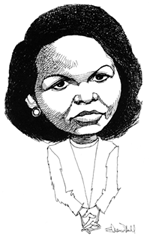 According to the latest data obtained by JBHE from the Institute of International Education, increased security measures and tightened controls on visa applications have resulted in a drop in enrollments of foreign students at U.S. universities. Overall, foreign student enrollments dropped 2.4 percent in 2004. Enrollments of students from African nations dropped by an even greater 5 percent. In 2004 there were 38,150 African students enrolled at U.S. colleges and universities. JBHE estimates that about 25,000 of these students are from black African nations. According to the latest data obtained by JBHE from the Institute of International Education, increased security measures and tightened controls on visa applications have resulted in a drop in enrollments of foreign students at U.S. universities. Overall, foreign student enrollments dropped 2.4 percent in 2004. Enrollments of students from African nations dropped by an even greater 5 percent. In 2004 there were 38,150 African students enrolled at U.S. colleges and universities. JBHE estimates that about 25,000 of these students are from black African nations.
At the U.S. University Presidents Summit on International Education in Washington, D.C., earlier this month, Secretary of State Condoleezza Rice stated that the United States "has never been more eager" to increase the number of foreign students studying at U.S. universities. She said that initially security concerns prompted delays in processing student visa applications, particularly from students in Middle Eastern countries. "There are legitimate security concerns that must be met," Rice told the university presidents. "If you are prepared to help us make certain that we can achieve a balance between openness and security, we are prepared to work with you. We are now approving 97 percent of our visa applications in one or two days."

The Black Wall Street Tycoon Who Keeps On Giving To Higher Education
In commemoration of the fiftieth anniversary of the Supreme Court's ruling in Brown v. Board of Education, in 2004 Alphonse Fletcher Jr. announced a $50 million commitment to fund people and institutions that are working to further racial equality. Fletcher, a graduate of Harvard University, is CEO of Fletcher Asset Management, a Wall Street hedge fund firm that manages more than $450 million in assets.
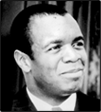 A major component of the grant money is devoted to the Fletcher Fellowship program. The Fletcher fellowships are available to individuals of any race. They are administered by the W.E.B. Du Bois Institute for African and African-American Research at Harvard University. Henry Louis Gates Jr., director of the institute, is the chair of the Fletcher fellows selection committee. In 2005 the first 12 Fletcher fellows each received grants of $50,000. A major component of the grant money is devoted to the Fletcher Fellowship program. The Fletcher fellowships are available to individuals of any race. They are administered by the W.E.B. Du Bois Institute for African and African-American Research at Harvard University. Henry Louis Gates Jr., director of the institute, is the chair of the Fletcher fellows selection committee. In 2005 the first 12 Fletcher fellows each received grants of $50,000.
Now Fletcher has made a further $3.2 million donation to establish the Alphonse Fletcher Professor of Law chair at the Columbia University School of Law. The endowed chair, named after Fletcher's father, will fund the research of a scholar who deals with issues such as criminal justice, education, and affirmative action.
The first occupant of the chair will be Jack Greenberg, an 81-year-old white scholar who was the assistant counsel for the NAACP Legal Defense and Educational Fund under Thurgood Marshall and argued the Brown case before the Supreme Court. In 1961 Greenberg succeeded Marshall as director counsel of the LDF. He has served on the Columbia law school faculty since 1984. 
  |
9.8% Percentage of all white adults over the age of 25 in 2003 who held a graduate degree.
5.3% Percentage of all black adults over the age of 25 in 2003 who held a graduate degree.
source: U.S. Bureau of the Census.
|
School Voucher Program For Low-Income Minority Students Ruled Unconstitutional By Florida Supreme Court
Public opinion polls continue to show widespread support among African Americans for public school vouchers, which permit parents of children from low-performing schools to transfer their children to better quality public schools or even to private or parochial schools.
But the voucher movement was dealt a serious blow recently when the Florida Supreme Court struck down the state’s school voucher program. In its ruling the court said that the voucher program violated a provision in the state constitution calling for a "uniform system of public education."
As a result of the decision, about 700 students who have been attending private school with state money will no longer be able to do so. A large percentage of the students using the private school vouchers are black or Hispanic.

Cleveland State University Names Two Blacks to Executive Positions
 Barbara Byrd-Bennett, chief executive officer of the Cleveland Municipal School District, is expected to take a position as executive-in-residence in the College of Education at Cleveland State University. Barbara Byrd-Bennett, chief executive officer of the Cleveland Municipal School District, is expected to take a position as executive-in-residence in the College of Education at Cleveland State University.
The university also announced that Julian Earls, the former director of the NASA Glenn Research Center in Cleveland, will become executive-in-residence at the College of Business. Last fall Earls was offered the presidency of Alabama A&M University but he turned down the position.

In Memoriam
Daniel Drake, a professor of educational administration at Cleveland State University, died of pancreatic cancer at his home in Lakewood, Ohio. He was 74 years old.
Drake was a native of Memphis, Tennessee, but moved to Cleveland as a young boy. He won an athletic scholarship to Miami University of Ohio for both football and track. After graduation he became a teacher and later an administrator in the Cleveland public school system. During this period he founded the Metropolitan Cleveland Alliance of Black School Educators, a group dedicated to improving education for African Americans. While working in the public schools, Drake earned a master’s degree in school administration from Cleveland State University and an educational doctorate from the University of Akron.
After retiring from teaching in 1985, Drake spent time as an assistant school superintendent in both Sioux Falls, South Dakota, and Milwaukee, Wisconsin. He then joined the faculty at Cleveland State University in 1991.
Jack Tanner, the first black federal judge in the northwestern United States, died from pancreatic cancer this past week at his home in Seattle. He was 86 years old.
Judge Tanner was appointed to the federal bench by President Jimmy Carter in 1978. He had a reputation for being unconventional. In one case he sentenced a woman, who had been convicted of assault with intent to kill her husband, to one day in prison. Judge Tanner thought the woman, who had been abused by her husband, was justified in her actions. The light sentence was later overturned by an appeals court. Over the past quarter century, Judge Tanner's rulings were reversed 146 times.
Tanner was born in Tacoma. His father was a longshoreman who campaigned for blacks to be permitted to join the union. Judge Tanner also worked on the waterfront while completing his studies at the University of Washington law school. He then opened a private practice in Tacoma and became active in the local NAACP, serving on the national board of directors for nearly a decade. In 1966 he unsuccessfully sought the Democratic Party's nomination for governor of Washington.

Grants
Norfolk State University is using a $750,000 grant from NASA, a $185,000 award from the National Science Foundation, and $225,000 from the state of Virginia to build an observatory on Fan Mountain, about 20 miles from Charlottesville. The observatory will house a robotic telescope that may be operated by a control panel on the campus of Norfolk State. Students will be able to see live images from the telescope in the classroom. Eventually these images will also be available over the Internet. Initial research efforts will be focused on gamma ray bursts.
Howard University received a $992,004 grant from the U.S. Department of Defense to establish a Center for Foreign Language Study. The center will promote the study of Arabic, Chinese, Korean, and Japanese among American students from elementary school through college.

|



